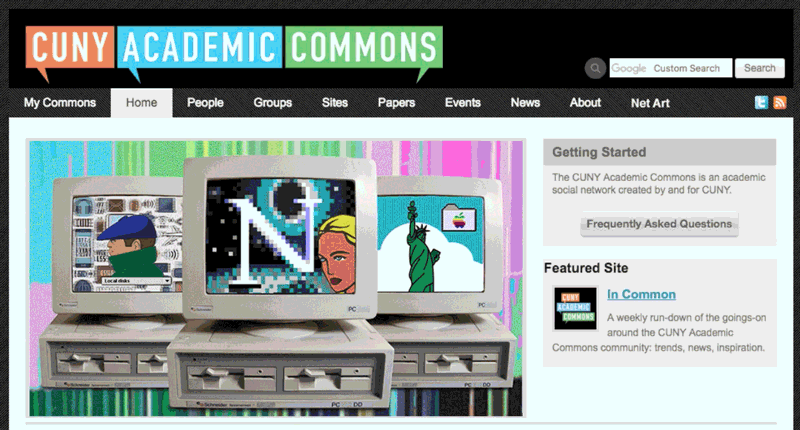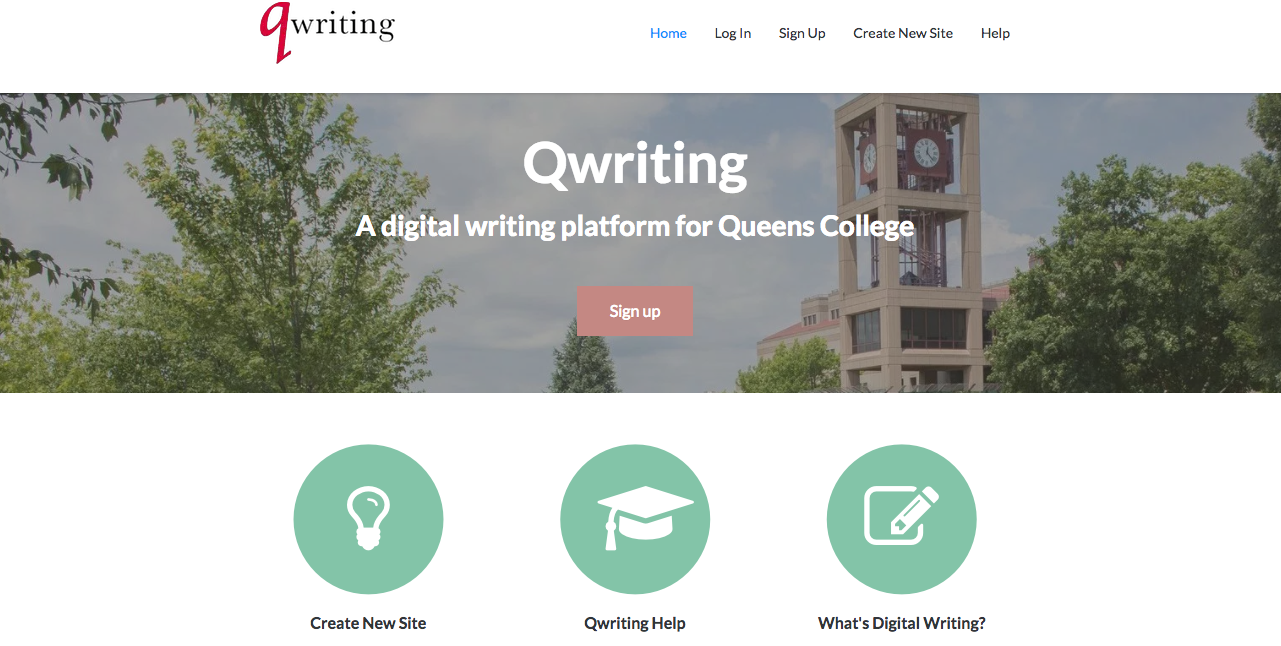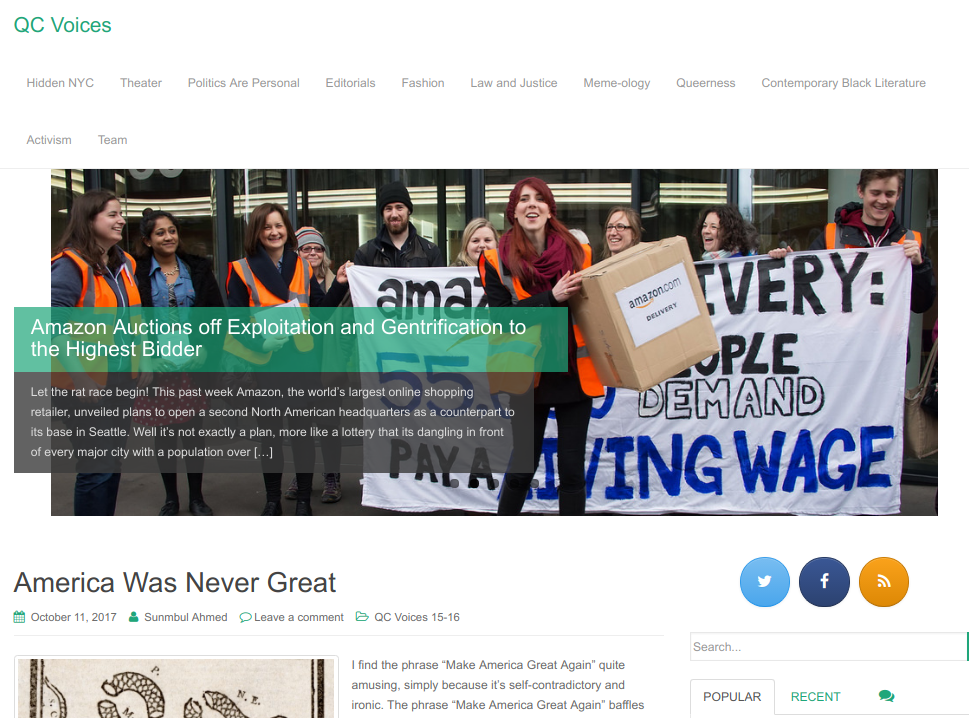digital pedagogy
Spotlight: Ryan Seslow and NET-ART on the CUNY Academic Commons
On 13, Nov 2017 | In Spotlight | By Jojo Karlin
Creator: Ryan Seslow
Project: NET-ART Course & Gallery on the CUNY Academic Commons
Discipline: Communication Technology, Digital Art, Digital Storytelling
Campus: York College
Follow: @ryanseslow

Description:
Over the last 8-10 months I have become an active contributor on the CUNY Academic Commons. (I have also proudly joined the commons’ sub-committee) I think it is a wonderful platform! I see the commons itself is an amazing space for activating creativity and collaboration between CUNY campuses, students, faculty and community members. After some research, ah, yes, I was a “commons voyeur” for a few years to learn and watch what was happening and how I could best contribute something new and of value.
I decided to create the NET-ART course on the Commons.
It began as a disruption (and still does) to the sidebar of the commons’ home page. Every other day I post a new animated GIF or a screen recorded series of Internet Art works that are co-dependent on a web browser to display and archive the works. The animations serve as a colorful contrast to the regularly published content. NET-ART on the commons is indeed an expressive and experimental digital art course, digital art gallery, exhibition space and a platform for interdisciplinary collaboration. An official or formal announcement about the NET-ART course launch has not yet been shared, but perhaps this Spotlight will serve as its introduction!
The Net-Art website on the commons will soon be launching its first series of open calls in three categories: Animated GIFs, Net-Art & Digital Art / Static / Memes!
This is the “hackable” course description:
“Net-Art is a remote online digital studio art course intended to expose and expand the vocabulary of new media art to the student’s personal visual statements. Students are expected to produce a related series of electronic art works with a concentration on experimentation and the transcendence of ideas. Through various processes, both manual and technology based, students will be exposed to the use and application of electronic media via desktop and mobile art practice. Students may reference their work in conjunction with prior interests in applied arts, photography, video, history, politics, social commentary, performance art as well as any other inter-disciplinary subjects of interest. The course will take place here on this URL using (OER) Open Education Resources, Public Domain and other Creative Commons Sources.”
Over the last several years I have been exhibiting and building online portfolios and repositories of my works:
Please have a look below for examples as they are relevant to the NET-ART Course work:
1. Professor Seslow’s Internet Art Exhibition on the Newhive platform – https://newhive.com/ryanseslow/profile/all
2. Professor Seslow’s Artist Profile on the Giphy Platform – https://giphy.com/ryanseslow/
3. Professor Seslow Art Repository on Flickr – https://www.flickr.com/photos/rmsmovement/
4. Ryan Seslow.com – https://ryanseslow.com – Lots of blog posts and otherness.
Spotlight: Jeff Allred and Research, Interpretation, Play: Billy Budd as Role-Playing Game via Ivanhoe for WordPress
On 27, Oct 2017 | In Spotlight | By Jojo Karlin
Project: Research, Interpretation, Play: Billy Budd as Role-Playing Game via Ivanhoe for WordPress
Project type: Digital Pedagogy, Writing
Campus: Hunter College
Follow: @jballred
Spotlight: QWriting 2.0
On 13, Oct 2017 | In Spotlight | By Jojo Karlin
Project director: Kevin Ferguson
Project: QWriting 2.0
Project type: Digital Pedagogy, Writing
Discipline: English
Campus: Queens College
Follow: @KevinLFerguson
Qwriting, a WordPress installation that serves the Queens College community, has over 19,000 users and hosts thousands of sites, including course blogs, student portfolios, and organizational pages. Qwriting 2.0 is a multiyear initiative to build on the Qwriting platform and the communities that rely on it. Over the past year, the Qwriting 2.0 initiative has included programs to support digital writing pedagogy, technical improvements to the Qwriting platform, increased support for teachers making use of Qwriting in their work, and increased support for student blogging initiatives such as QC Voices.
In spring of 2017, the Qwriting 2.0 team began a workshop series in digital writing pedagogy for instructors at Queens. This series, designed to show teachers in a variety of disciplines how best to deploy Qwriting and WordPress in their classrooms, engaged topics such as QWriting for Digital Assignments and Assessment and Strategies for Online Discussion, Annotation, and Collaborative Work. These sessions provide instructors with both the technical skills needed to use WordPress effectively and the space to consider how digital writing pedagogy can augment their own teaching practices.
To provide the Queens College community with a high-impact example of digital writing in practice, Qwriting 2.0 provides support for QC Voices, a flagship site that features student thought on issues such as queerness, social justice, equal representation in literature, and life in New York City. QC Voices highlights not only the diversity in perspective of Queens College students, but also their technical proficiency in both writing and modern digital rhetoric. The Qwriting 2.0 team maintains the site and guides and promotes the work of student bloggers as they create work that is routinely read by hundreds or thousands of visitors, both within and outside the Queens College community.
A critical part of the Qwriting 2.0 initiative is the ongoing evaluation and improvement of the Qwriting platform, including considerations of usability, aesthetics, and performance. In the last year, the Qwriting 2.0 team has made technical improvements to increase the speed of the platform, redesigned the site’s home page and documentation, and rethought the signup and site creation process to better serve common use cases. The team also actively encourages adoption of the platform through consultations, class visits, and office hours.




 Welcome to the blog of the CUNY DHI, an effort to build momentum and community around Digital Humanities practitioners at CUNY. We hope you'll join us at our upcoming events and that you'll follow this blog to hear about the latest news in the field.
Welcome to the blog of the CUNY DHI, an effort to build momentum and community around Digital Humanities practitioners at CUNY. We hope you'll join us at our upcoming events and that you'll follow this blog to hear about the latest news in the field.



Recent Comments